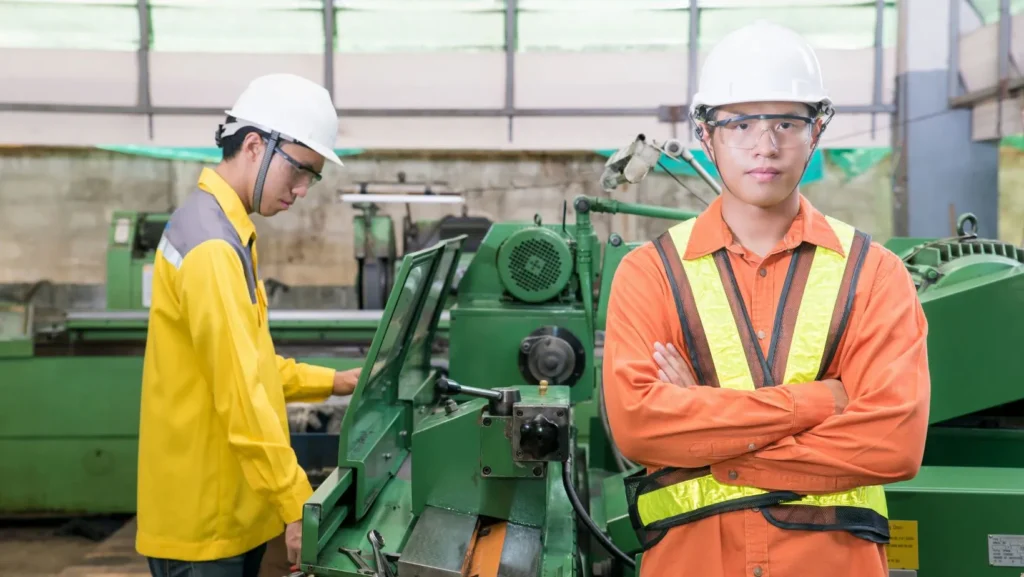Learning Outcomes for the Level 6 Diploma in Mechanical Engineering 360 Credits – Three Years:
Year 1: Foundation and Core Engineering Principles
- Mathematics for Engineering
- Develop proficiency in fundamental mathematical techniques for solving engineering problems.
- Apply calculus, algebra, and trigonometry in engineering contexts.
- Engineering Principles
- Understand and apply core engineering concepts, including forces, motion, and energy.
- Develop a solid foundation in engineering mechanics and systems.
- Materials Science and Engineering
- Gain an understanding of the properties and behavior of materials used in mechanical engineering.
- Analyze material selection and performance in engineering applications.
- Engineering Drawing and CAD
- Learn to create and interpret engineering drawings.
- Develop skills in Computer-Aided Design (CAD) for mechanical system modeling.
- Statics and Dynamics
- Apply the principles of static and dynamic analysis to engineering problems.
- Solve for forces and motion in mechanical systems.
- Introduction to Thermodynamics
- Understand the basic laws of thermodynamics and their applications in engineering systems.
- Analyze energy transfer and transformation in mechanical systems.
- Manufacturing Processes
- Learn key manufacturing techniques and their application in the production of mechanical components.
- Understand processes such as casting, machining, and welding.
- Fluid Mechanics
- Gain an understanding of fluid properties and fluid flow.
- Apply principles of fluid mechanics to practical engineering problems.
- Electrical and Electronic Systems for Engineers
- Develop an understanding of basic electrical circuits and components.
- Learn how electrical systems are integrated into mechanical engineering applications.
- Engineering Mathematics for Design
- Apply mathematical methods to solve design challenges in mechanical engineering.
- Use advanced mathematics to model and analyze mechanical systems.
- Mechanical Design Fundamentals
- Understand key principles in mechanical design, including material selection and stress analysis.
- Develop skills in designing components and systems for mechanical applications.
- Engineering Project Management
- Learn basic project management skills, including planning, risk management, and resource allocation.
- Understand how to manage engineering projects efficiently.
Year 2: Advanced Engineering Concepts and Applications
- Advanced Thermodynamics
- Deepen your understanding of thermodynamic cycles, efficiency, and energy systems.
- Apply advanced thermodynamics in the analysis and design of engineering systems.
- Strength of Materials
- Analyze the strength and deformation of materials under different loading conditions.
- Apply concepts such as stress, strain, and material failure to real-world engineering problems.
- Heat Transfer and Fluid Dynamics
- Understand the mechanisms of heat transfer and fluid flow in mechanical systems.
- Apply these principles to solve complex engineering problems.
- Advanced Manufacturing Techniques
- Learn advanced manufacturing methods, such as CNC machining, additive manufacturing, and robotics.
- Understand the advantages and limitations of these techniques in industry.
- Mechanical Vibrations and Acoustics
- Analyze mechanical vibrations and resonance in engineering systems.
- Apply principles of acoustics to control noise and vibration in mechanical designs.
- Engineering Dynamics and Control
- Understand the behavior of dynamic systems and apply control theory to stabilize mechanical systems.
- Model and control mechanical systems to optimize performance.
- Design and Analysis of Machine Elements
- Design and analyze machine elements such as gears, shafts, and bearings.
- Understand the principles that govern their operation and performance.
- Control Systems for Mechanical Engineering
- Apply control theory to mechanical systems, including feedback control and system stability.
- Design control systems for efficient mechanical operations.
- Engineering Materials and Failure Analysis
- Investigate material failure modes, including fatigue, fracture, and corrosion.
- Apply failure analysis techniques to improve mechanical system reliability.
- Computer-Aided Engineering (CAE)
- Develop skills in using CAE tools for simulation and design validation.
- Apply Finite Element Analysis (FEA) and Computational Fluid Dynamics (CFD) in mechanical design.
- Mechanical System Design
- Design and optimize mechanical systems considering factors such as performance, safety, and cost.
- Solve engineering challenges in system-level design.
- Project Planning and Cost Estimation
- Learn techniques for estimating costs and planning engineering projects.
- Develop the ability to manage project timelines, budgets, and resources effectively.
Year 3: Specialization and Practical Application
- Advanced Mechanical System Design
- Apply advanced design techniques to create complex mechanical systems.
- Incorporate optimization methods to improve system performance and efficiency.
- Energy Systems and Sustainability
- Study renewable energy systems and sustainable design practices in mechanical engineering.
- Design energy-efficient systems that minimize environmental impact.
- Advanced CAD and 3D Modeling
- Master advanced CAD software for 3D modeling and simulation of mechanical systems.
- Develop detailed models and prototypes of engineering designs.
- Finite Element Analysis (FEA) for Mechanical Engineers
- Use FEA techniques to analyze and optimize mechanical structures.
- Solve complex engineering problems involving stress, strain, and deformation.
- Advanced Manufacturing and Robotics
- Learn advanced manufacturing processes and the integration of robotics in production systems.
- Apply automation to optimize manufacturing operations.
- Mechatronics and Automation
- Study the integration of mechanical systems, electronics, and control systems to create automated systems.
- Design mechatronic systems for industrial applications.
- Engineering Research Methodology
- Develop research skills for investigating engineering problems and solutions.
- Learn how to conduct experiments, analyze data, and present findings.
- Industrial Engineering and Process Optimization
- Apply industrial engineering principles to optimize manufacturing processes.
- Analyze workflows and processes to improve efficiency and reduce costs.
- Design for Manufacturability
- Learn how to design mechanical systems with manufacturability in mind.
- Optimize designs for ease of production and cost-effectiveness.
- Professional Practice in Mechanical Engineering
- Understand the professional and ethical responsibilities of a mechanical engineer.
- Learn how to navigate industry standards, regulations, and communication in the workplace.
- Engineering Innovation and Entrepreneurship
- Explore opportunities for innovation and entrepreneurship within the engineering sector.
- Develop skills to bring new engineering solutions and products to market.
- Capstone Project/Thesis
- Apply knowledge from the entire program to complete a comprehensive engineering project or research thesis.
- Demonstrate the ability to solve real-world engineering problems and present findings professionally.

